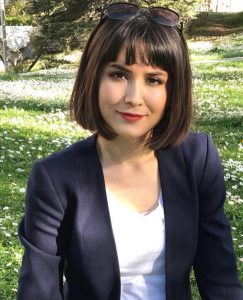 Zeynep Ertekin is a visiting Fulbright Scholar who is working in The Gunnar Laboratory for Developmental Psychobiology. Ertekin is from Middle East Technical University (METU) in Turkey and was inspired to come to the Institute of Child Development (ICD) to further her research of at-risk children.
Zeynep Ertekin is a visiting Fulbright Scholar who is working in The Gunnar Laboratory for Developmental Psychobiology. Ertekin is from Middle East Technical University (METU) in Turkey and was inspired to come to the Institute of Child Development (ICD) to further her research of at-risk children.
Below, Ertekin discusses how her work in the Gunnar Lab compliments her Ph.D. thesis work back home.
How did you become interested in the field of developmental psychology?
I realized my enthusiasm for developmental psychology and decided to become an academic during my undergraduate education. I took a variety of elective courses from different fields and participated in many projects, activities, and internships. For instance, I had a chance to work with institutional children in the scope of a field practice course and I spent one summer as an intern in the Child Institution. These experiences shaped my research interest too. I realized that I would be happy if I could have a chance to make even a small difference for children at risk. I believe that it would be most helpful in the long run to do so with scientific evidence.
How would you describe your educational background?
I am a Ph.D. candidate in developmental psychology at Middle East Technical University (METU) in Turkey. I earned my bachelor’s degree in psychology and master’s degree in developmental psychology at the same university. I came to ICD as a visiting student researcher with the Fulbright Scholarship.
How would you summarize your previous research experience?
Throughout my graduate education, I had a chance to conduct small studies and be involved in many research projects with my professors and colleagues at METU. Since 2013, I have been working as a research assistant in a longitudinal project called “Turkish Care Types Study” which was coordinated by my supervisor Sibel Kazak Berument. The project was about the development of infants and children under institutionalized care in different care types.
My master’s thesis was about the self-development and self-regulation skills of toddlers who were residing in institutions, group homes and foster care as a part of this project.
My PhD thesis is a combination of this longitudinal project with one further step on the findings, and aims to examine the role of early adversity on cortisol levels and cognitive development of infants. I gathered data from infants reared in low socio-economic environments. Their cognitive development will also be compared with the institutionalized infants. Currently, I am working on the data analysis.
How would you articulate your main research interests?
My research interests are the development of at-risk children; especially children who experience early adversity, such as institutionalized children or children from low socioeconomic status family environments.Besides the environmental effects, I am also interested in the temperamental characteristics of children, which may affect the level of environmental effects. As a developmental outcome, I am particularly interested in self-development in early years, and cognitive development.
What drew you to the University of Minnesota and the Institute of Child Development?
The Institute of Child Development at the University of Minnesota is one of the best departments in developmental psychology not only in the USA but also around the world. There are many leading researchers and distinguished professors here. Therefore, it was my dream school to improve myself in the field. I am really happy to be here.
What do you hope to accomplish during your time at the Gunnar Lab?
My research interests align with the research that is carried out in Gunnar Lab. I wanted to add psychobiological variables to my PhD thesis. For me, there is a lot to learn from Professor Megan Gunnar and lab colleagues here, since the Gunnar Lab is a pioneer of this area around the world.



